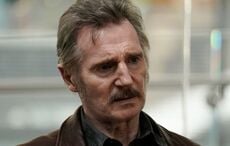Did you ever ask yourself how did every Irish town ended up with at least twenty public houses? Did you ever wonder how the rural landscape from Malin Head to Mizen Head came to be filled with deserted cottages, abandoned workhouses, burial plots, and broken down factories with tiny stone windows that only a crow could squeeze through?
Irish playwright Tom Murphy has. For over forty years he has made a point of gazing directly at what the rest of us have blithely overlooked, transfixed by the little details of our own lives.
It can’t have been easy for him, this lifelong investigation. It must have meant gaining a reputation for asking awkward questions onstage and off, for decades. It inevitably meant relentless challenges to authority, to established social conventions, to agreed history, and at times it must have made him disagreeable too.
Judging from Murphy’s work, which is currently being seen at a triumphant mini-retrospective at the Lincoln Center Festival, it required a level of intellectual courage and commitment that makes the recent work by other Irish dramatists look insipid in comparison.
That’s why it’s thrilling to see Murphy’s plays get the recognition they richly deserve at Druid Murphy, director Garry Hynes’s extraordinary mini-retrospective of three of Murphy’s signature works. Druid Murphy is not just a highlight of my theater-going year; it’s been the highlight of my theatre-going life.
Over the course of his extraordinary career Murphy has explored – and often interrogated - the Irish character or psyche to the root, which he contends was unalterably altered and defined by the famine.
Each of these three brilliant plays help to bolster that contention, and I have never witnessed a more lucid theatrical exploration of the Irish experience on any stage.
In Conversations On A Homecoming, the first play in the all-day cycle of three shows, a group of old friends gather’s in their local pub to welcome home their pal Michael, who has been living in New York where he’s been trying to start a career as an actor.
After a little bar table banter it becomes clear that Michael’s former best friend Tom will be taking the opportunity to settle old scores, but as he tears at his old friend his bravado gets stripped away and we see what’s really eating at him, he’s brokenhearted over having been left behind.
Rootlessness, longing, homesickness, uncertainty, the whole familiar catechism of the Irish emigrants experience is under the microscope here but Murphy abhors cheap sentimentality or easy summations. Longing shapes every scene in this searingly beautiful play, in particular the longing for a deeper connection, for a bit of love and peace, and that simple human desire becomes a universal one in Murphy’s endlessly absorbing play.
In A Whistle In The Dark we meet the Carney family, a proud traveler family from County Mayo who are locked in a pointless blood feud with another traveler clan. Through this simple prism Murphy conjures every damaged and damaging Irish patriarch whilst exploring their painful legacies.
Were that all Murphy does he would deserve lasting monuments, but he delves further and deeper into the souls of his creations the better to understand their individual motives and the society that has created them.
Niall Buggy and the prodigiously talented Aaron Monaghan took possession of the stage throughout and astonished the Lincoln Center’s American audience with the plays atavistic power.
Famine, the concluding play of the three-part retrospective, was the most shattering work in an evening of intensely provocative productions. Being the most thematically ambitious play of the night it faced impossible challenges: how do you convey the scope and legacy of a disaster that led to the starvation deaths of over one million Irish people and led a further two million of them to the emigrant ships?
Famine begins with blight on a potato crop but it ends with the breaking of every natural bond of human affection that binds a family and a nation together. Garry Hynes has directed all three plays, which add up to the most defining statement on the legacy of the great hunger and its cultural and historical echoes that it has ever been my privilege to witness.
First Murphy introduces us to the villagers of Glanconor, led by John Connor it’s proud patriarch (played with a pitch perfect slow burn intensity by Brian Doherty) who refuses to be victimized by the great hunger. But as the play progresses we see this man slowly ground to powder before out eyes.
The effect of seeing these three plays back to back is symphonic. It is also strangely heartening. For all that they record and commemorate the long, long shadow of the famine – they also stand as an eloquent witness and guidepost to our decades long struggle to step out of its shadow.




Comments